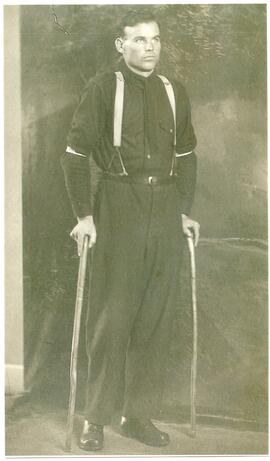Jaroslaw Iwanusiw (July 24, 1905, currently non-existent Ukrainian village of Lopinka, territory of contemporary Poland - April 26, 1998, Edmonton) was born to the family of Mykola and Maria (Shyh) Iwanusiw. He was the third of five children. He completed his schooling as well as one year of theology in Peremyshl and then earned a degree in forestry engineering at the University of Vienna.
In 1931, he married Iwanna Oksana Smolynsky and began work in Stanislaviv. Following the outbreak of the war in 1939, the family moved several times within Europe, meeting up with American soldiers in Bavaria on Easter Sunday, 1945. They stayed in Pfarkirchen and Karsfeld and then Camp "Orlyk" Berchtesgaden. Their family then had four children: Motria, Oleh, Orysia, and Bohodara.
The family immigrated to Canada in 1948 to work out a sugar beet contract in the Lethbridge area. With the contract fulfilled, the family moved to Lethbridge and then, in 1950, to Edmonton where Jerry worked as a carpenter until 1956 when he obtained a position of an Alberta Land Surveyor at the Government of Alberta in the Surveys Branch of the Department of Highways. He continued his career with the government until compulsory retirement at age 65 in 1970. In that period, his survey work was primarily in the Peace River region of rights-of-ways for highways and local roads.
Following retirement from the government, Jerry chose to continue in the surveying and mapping field in the capacity of a technologist, working for the Canadian Engineering & Surveys Inc. until 1987, and then for the Challenger Surveys and Services Ltd. until 1995. He was an active member of Plast (since 1921 in Peremyshl), a founding member of the Association of Foresters and Woodmen, a member of the Ukrainian National Federation of Canada, a founder of the Shevchenko Foundation in Canada, a representative of the "Encyclopedia of Ukraine" dissemination in Alberta, and a treasurer of the Patronage NTSh-EY-2 in Edmonton.
For his years of dedicated service, he was cited with both the silver and gold awards of the highest merit. In his 90th year of life, Yaroslaw and Iwanna moved to St. Michael's Lodge and then a nursing home.
Sources:
Compiled By C.W. Youngs with assistance from Motria, Oleh, Orysia, and Bohodara (http://albertalandsurveyhistory.ca/index.php?title=Yaroslaw_(Jerry)_Iwanusiw)
Materials of the Jaroslaw Iwanusiw collection. UF2020.028.
